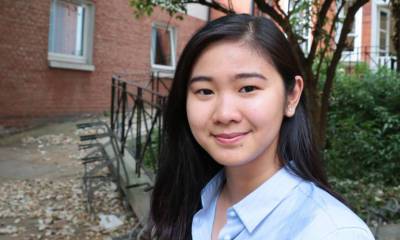Leonita Ariesti Putri, MSc in Psychoanalytic Developmental Psychology

1. What is your educational background?
I have an undergraduate degree in Medical Science, and a professional qualification as a medical doctor (General Practitioner). I completed my studies in my home country, Indonesia.
2. What are your motivations for pursuing a graduate-level qualification?
I wanted to enhance my research skills and statistical knowledge to provide a strong foundation for further clinical/ professional training in psychiatry.
3. Why did you apply to UCL for graduate study?
It is one of the world-leading universities and many scientists, have majorly contributed to ideas, scientific discovery, and technology. I want to learn from the best and learn in a stimulating academic environment. UCL offers a very unique and tailored programme for my chosen area of study, Psychoanalytic Developmental Psychology. It is conjoined with the Anna Freud Centre where all staff are also clinicians/researchers. This clinical approach is invaluable. Also Anna Freud was the daughter of Sigmund Freud, 'the father of psychoanalysis'. How could it be better?
4. What is the best thing about your course?
The quality of the teaching staff and the method of learning from the roots of psychoanalysis are both excellent! The programme combines teaching, research, and semi-clinical (observations). This enriched and broadened my perspective and learning experiences. The students on my course were from all over the world. There were nine people in my seminar group and there were more than seven different nationalities! The atmosphere of learning is very supportive, conducive, and non-judgmental. I feel safe to verbalise my opinions and thoughts, and ask questions.
5. What do you find interesting about your field of study and what inspires you?
It complements the approach to understanding human beings. As my background was from hard-science, psychoanalysis fills the gaps in my knowledge about the qualitative aspects of the human mind/psyche. It inspires me to treat and see people as one whole complete being, made up from cells and neurochemical substances, but also from experiences and fantasies.
6. What are your career plans once you’ve completed your current programme of study at UCL?
I plan to go back to my home country and continue my professional training in psychiatry as it has always been my calling to serve my birthland.
7. Do you think studying at UCL Faculty of Brain Sciences is a good investment?
Very! All the facilities and resources – you won’t find anywhere else.
8. Have you undertaken any networking opportunities either as part of your degree or outside of your studies?
There are a lot of networking opportunities with people and colleagues with similar interests. My course often invites guest lecturers or speakers for extra seminars.
9. What is it like studying in London and how do you think it has benefited your studies?
London is a very busy and mixed culture. It has benefited my studies by providing all the facilities I need, and the culture of being open, respectful, and inclusive has made me feel comfortable and brave enough to speak my mind.
10. Has there been an element of your degree programme that has impressed you or been particularly valuable?
The observational module, both the parent-infant observation and toddler group/nursery observation.
11. How do you think the system of learning/researching at UCL differs from that in your own country?
The facilities at UCL are very high-tech. The relationship between the lecturers and students is more reciprocal and two-way (discussion, sharing). This helped me to think more critically. The balance between study and free time is high on the agenda for UCL, thus helping the student to study in better conditions. The assignments emphasise critical thinking, so students learn not to memorise but to understand. This helps student development.
12. If you received funding either through a scholarship, award, studentship or bursary, how has it helped you achieve your aspirations and what impact has it had on your studies?
I received fund endowment from my country. It has helped me a lot financially and has given me one less problem to worry about, so I can focus solely on my study.
13. Is there anything else you would like to say about your time at the Faculty of Brain Sciences?
I would like to encourage people to challenge themselves because the Faculty of Brain Sciences is the right place for people who wish to pursue a deep understanding about the brain, mind, and other related topics. It is the best learning environment I have ever experienced.
 Close
Close

